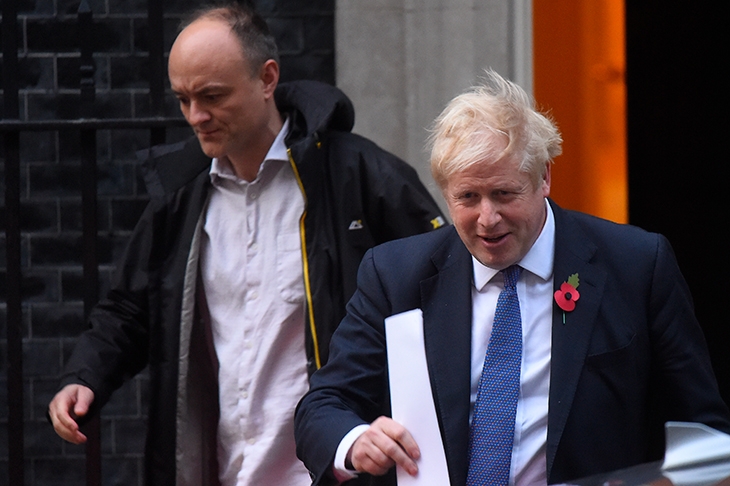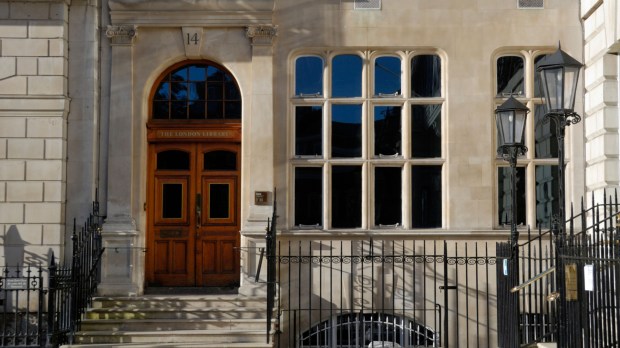Like almost everyone else writing on the subject, I have no idea whether Boris Johnson told colleagues in October that he would rather ‘let the bodies pile high in their thousands’ than have another lockdown. When such words are reported, they are given to journalists ‘on lobby terms’ and are therefore unattributable. But surely the report should indicate from which point of view they come. In this case, the BBC cites ‘sources familiar with the conversation’, a phrase which gives it permission, it thinks, to run headlines like ‘Boris Johnson’s “bodies pile high” comments prompt criticism’, as if it knows that the Prime Minister definitely spoke those words. Surely licence-fee payers need also to be told that the sources giving these stories are Boris’s enemies, just as clearly as those denying them are ‘Downing Street sources’. This is a war, so war correspondents should explain with whose troops they are embedded.
Not that I would be surprised if Boris did use the words quoted. Many people express themselves extremely in private, in the heat of the moment, or sometimes just because they have the sort of mind which likes to provoke argument as part of the search for solutions. Lots of us say things like ‘If that man says that once more, I’ll kill him’, or ‘I’d rather die of Covid than not be allowed to go to the pub’, or ‘All Brexiteers/Remainers should be taken out and shot’, without even faintly meaning it. It is worth noting that most of Boris’s alleged private remarks and texts did not transpire in action. Even better-controlled leaders privately make threats they do not intend to fulfil. Just before she set out to sign the Lancaster House agreement to turn Rhodesia into Zimbabwe, which her government had just achieved, Mrs Thatcher stopped in the entrance hall of 10 Downing Street and said to her private secretary: ‘I am not going to shake the hands of terrorists’ (meaning Robert Mugabe and Joshua Nkomo); but she did, of course, and she knew she would. If we become unable to distinguish between private and public conversation, we shall all go mad. Perhaps we already have.
As I write, Marsden Moor in Yorkshire has been burning for two days. The fire began on Sunday afternoon, reportedly started by a portable barbecue. This coincided with Extinction Rebellion’s exciting mass weekend trespass in which people tramped and camped wherever they wanted in wild places. In compliance with the protocols which nowadays run their lives, the firemen knocked off at 8 p.m. that night, although the fire was still burning. A dozen or so gamekeepers from neighbouring moors, assisted by local farmers, had already turned up to help. Without the fire brigade’s equipment, they did what they could through the night to fight the fire alone, using blowbacks to reverse it. It went out, but reignited later. Marsden Moor is owned by the National Trust, who last year launched a campaign jointly with the RSPB called Ban the Burn. This sought to prevent the controlled winter burning of strips of heather which is used on grouse moors to maintain the right habitat for the birds and create fire breaks. Instead, the Trust extolled its policy of ‘rewetting’ the moors as the best means of preventing wildfires. They were warned this would not work. After the 2018 Saddleworth Moor fire, Rob Marrs, professor of applied biology at Liverpool University, said: ‘Leaving the land alone causes much more damage than controlled burning, because there’s more heather to burn so it gets hotter and spreads to the peat, which in turn spreads the fire. It wasn’t a matter of if, but when, and that when is now.’ In 2019, Marsden Moor lost 1,700 acres to wildfire. Things are approaching that scale this time. Film of the fire shows the timbers, which block gullies to hold up water in the interests of rewetting, burning merrily. No one from the National Trust joined the nocturnal band of volunteers, and when the Trust put out a statement on the fire on Monday, it failed to thank them. By Tuesday, the wind had changed, the smoke had reached Huddersfield and the Trust’s carbon footprint was visible across a burning mile of moorland.
The lack of rain, the cold east wind and beautiful sun have been the same for us in rural southern England every day this month, with a frost almost every night. I wonder if these conditions explain why, for the first time in my life, I have not heard a cuckoo in April.
This column’s recent items about Indian English produce an interesting response from Australia. Professor Andy Kirkpatrick, from Brisbane, tells me he has recently brought out a book called Is English an Asian Language? (CUP) — a question which he answers in the affirmative. Reaching beyond the most fruitful source of India, he also cites the two-way influence in other Asian languages such as Chinese, Malay and Japanese. I particularly like this example he relays of Philippine English: ‘trapo — a derogatory term for a politician perceived as belonging to a conventional and corrupt ruling class. Trapo is a combination of the two words that make up the English phrase “traditional politician”, but it is also the Spanish word for a cleaning cloth, which has also been borrowed into Tagalog and other Philippine languages.’ This elevates trapo ‘to a clever and provocative play on words that equates a corrupt politician to a dirty rag, and from a mere loanword to a five-letter distillation of centuries of Philippine political, cultural, and linguistic history’. I feel trapo is much overdue for use back in Blighty (which, by the way, is a word deriving from India).
A website called samosapedia, which crowdsources the ever-changing language of Anglo-Indian, offers this usage from Madras (Chennai) — utterclops, meaning ‘something really, really bad’. It derives from ‘utter collapse’ and is tragically appropriate for the state of the Indian health service as it breaks under the latest wave of Covid.
Got something to add? Join the discussion and comment below.
Get 10 issues for just $10
Subscribe to The Spectator Australia today for the next 10 magazine issues, plus full online access, for just $10.
You might disagree with half of it, but you’ll enjoy reading all of it. Try your first month for free, then just $2 a week for the remainder of your first year.















Comments
Don't miss out
Join the conversation with other Spectator Australia readers. Subscribe to leave a comment.
SUBSCRIBEAlready a subscriber? Log in